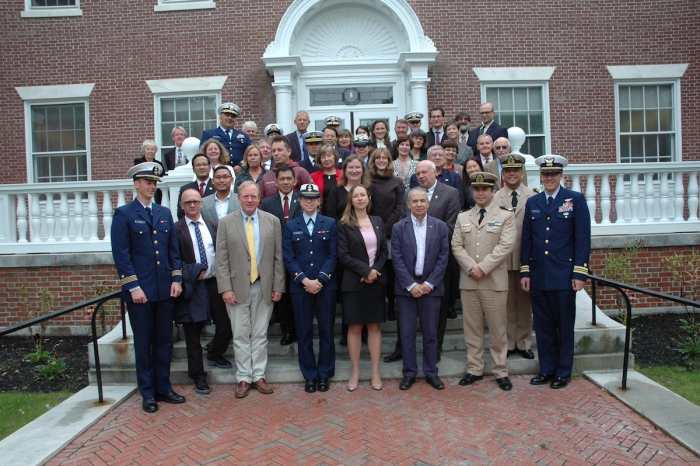By: Cara Condit, Director for Arctic Study and Policy, U.S. Coast Guard Academy
The U.S. Coast Guard Center for Arctic Study and Policy (CASP) organized the recent "Governing Across the Waves Workshop: Global Insights for Transboundary Waterways Management in Sensitive and Congested Maritime Spaces," which aimed to support the ongoing efforts by the U.S. and Russian governments to achieve the shared objectives in the Bering Strait region of safe, secure, and environmentally responsible maritime traffic.
Established in September 2014, CASP serves as the Coast Guard's leading Arctic policy research center and think tank, and brings together diverse maritime specialists to collaborate on effective solutions to challenges in the Arctic and beyond. CASP is located on the grounds of the U.S. Coast Guard Academy in New London, Connecticut. CASP fulfills a key initiative to accomplish strategic objectives in the U.S. Coast Guard Arctic Strategy and Implementation Plan.
With a small but experienced staff, CASP's mission is "[t]o increase the effectiveness of governance and operations in the Arctic by promoting research and academic thought, broadening collaborative partnerships, and educating future leaders about the complexities of this unique region." CASP accomplishes this mission through research and the organization of academic conferences. The Governing Across the Waves workshop held 26–27 September 2016 is an example of how effective CASP can be for the Coast Guard.
During the two-day workshop, the question posed was simply: what lessons might be learned from other regions of the globe? To answer this question, CASP partnered with Bowdoin College and the World Wildlife Foundation to convene a globally and disciplinarily diverse group of over fifty experts with a breadth and depth of maritime transboundary expertise. Official delegations from Japan, Argentina, Chile, and Indonesia provided critical context to panels of national and international scholars and advocates. The United States and Russia participated in the workshop as observers.
"This meeting was a real opportunity to learn from our counterparts who have experience with the challenge of managing shared straits and waterways," offered Mike Emerson, the Coast Guard's Director of Maritime Transportation Systems, "as well as tap into the work of the academic community on issues like coastal planning and protected areas."
Cadet Lucy Daghir, a student at the U.S. Coast Guard Academy, echoed this sentiment: "It was incredible to be in the room," she noted, adding that the workshop "opened my eyes to the possibility of international collaboration in the search for creative problem solving and policy implementation."

The workshop started with the baseline acknowledgement that, as Arctic ice retreats and ship traffic increases through the narrow Bering Strait, the U.S. and Russia have an ever-increasing interest to manage this emerging maritime chokepoint. By learning from other countries with shared responsibility for transboundary waterways, the workshop's objective included a product aimed at informing a Bering Strait model of management. To collect the data, CASP asked the experts to address issues broadly organized into five substantive panels:
- Introduction to Bering Strait region.
- Ensuring safe and secure maritime activity.
- Ensuring environmentally responsible maritime activity.
- Ensuring resilience in a dynamic social-economic-environmental context.
- Ensuring coordinated decision-making and management.
Each panel submitted recommendations regarding: 1. best practices; 2. lessons learned; and 3) further research needs as developed during the guided discussion. CASP assimilated and summarized these recommendations into the Waves 2016 Report detailing the findings as well as plans to complete a more in-depth, scholarly volume in the near future. The key findings included the importance of regular dialogue between cooperating nations, conforming to a shared vision, ensuring political and financial support, and putting forth efforts to change human behavior to promote policy compliance.

The relationships established during the workshop, buoyed by the in-depth discussions, are already having an impact on Coast Guard policy in the Bering Strait. In October 2017, a Coast Guard delegation, including CASP Arctic Scholar Dr. Rebecca Pincus, traveled to London to meet with the Russian Ministry of Transport on possible shipping route options. Through CASP's unique ability to bring together international delegations and academic scholars, the Coast Guard found a forum for engaging the Russian Ministry of Transport on crucial issues not limited to one nation's waters. Since the London meeting, the Coast Guard continues to work with its Russian counterparts. Mr. Emerson anticipates a joint U.S.-Russia submission to the International Maritime Organization shortly: an agreement that will ensure the safe transit of vessels through this sensitive ecological environment and secure the economic viability of the sea passage.
Further information is available on the CASP website.
 Cara Condit is the Executive Director of the USCG Center for Arctic Study and Policy (CASP), where she is guiding the next era of Arctic research and collaborative policy advancements. Cara received her J.D. from Suffolk University Law School in Boston, Massachusetts, and her LL.M. in National Security and U.S. Foreign Relations Law from the George Washington University Law School in Washington, D.C. Cara specializes in policy and legislation to further environmental compliance and enforcement efforts in the maritime domain.
Cara Condit is the Executive Director of the USCG Center for Arctic Study and Policy (CASP), where she is guiding the next era of Arctic research and collaborative policy advancements. Cara received her J.D. from Suffolk University Law School in Boston, Massachusetts, and her LL.M. in National Security and U.S. Foreign Relations Law from the George Washington University Law School in Washington, D.C. Cara specializes in policy and legislation to further environmental compliance and enforcement efforts in the maritime domain.
